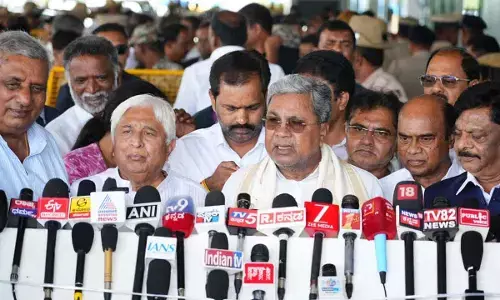Commuting in Bengaluru still an issue for disabled, elderly

Representational image
Although the BMTC has introduced low-floor, ramp-accessible buses that are friendly to the disabled, most of the other buses still have footboards that are too high off the ground, and the majority of Bengaluru’s infrastructure continues to provide obstacles for the disabled
Bengaluru: In Bengaluru, access for commuters is a major problem, particularly for elderly people and those with disabilities. The city has an accessibility issue that demands improvement, despite being the most desirable place to reside in India. This issue is poignantly highlighted by the thousands of elderly, weak, and disabled people who are terrified of taking the next step.
Although the BMTC has introduced low-floor, ramp-accessible buses that are friendly to the disabled, most of the other buses still have footboards that are too high off the ground, and the majority of Bengaluru's infrastructure continues to provide obstacles for the disabled.
"The public sidewalks, footpaths, bus stops, and other facilities were not made to be user-friendly for people with disabilities. The majority of BMTC buses don't have low floors, making it challenging to commute on them. There is much more to be done than simply reserving seats for those with disabilities in buses and other public transportation vehicles," said Vaishali, a resident of South Bengaluru, who lost her legs to polio.
"Even while taking the Metro, I am anxious because the doors of the train close so quickly. It's challenging to hold the grab rail in the train because it's not at armrest level, and that it's tough to approach or exit trains in a wheelchair due to the space between the train door and the platform. Instead of providing assistance, they could install ramps so I could commute independently," she added.
In addition to this, going out for a walk has proven to be challenging for people with disabilities. "Now that there are more vehicles on the road, walking has become more challenging, especially for people like myself who have disabilities. On the roadways, two-wheelers are the most problematic. Even strolling alongside the road has become challenging, not just when crossing it," added Vaishali.
Senior citizens like me find it challenging to walk on uneven footpaths said an 80-year-old resident of Basavanagudi. "Gandhi Bazar streets are good examples of popular shopping spots. Since vendors have encroached on the footpaths, pedestrians must rely on the main roads for their daily commute. When traffic is heavy, walking on the roadways and crossing becomes extremely risky. Vehicles are parked past the zebra crossing at the signals. It becomes extremely challenging to cross within the short signal time," he added.
"One day, I was nearly hit by a two-wheeler before it sped away. The majority of two-wheeler drivers are reckless and they don't care if elderly folks are walking," he remarked. "Street vendors, illegal parking, and of course, infamous potholes dominate the sidewalks. As a result, accidents happen frequently. For the blind to move about safely, the pavement must be levelled uniformly and have a designated walking path," said a 26-year-old who lost his eyesight at a young age. It is challenging to commute in Bengaluru because many locations lack signboards. "In addition to this, motorists riding on pavements and cycle tracks often put the lives of pedestrians at risk. Some of them even choose to skip signals which makes the commute tough for us as we cannot hear them approaching until we see them. Some buses have incorrect destination boards, making it challenging for us to determine the location to which the bus is travelling," added Sanketh, who is hard of hearing.
Public spaces can be made accessible by just incorporating a few changes, according to a 26-year-old architect who wished to remain anonymous. "For starters, building ramps and inclined surfaces, providing wheelchairs and hearing aids, and other measures should be taken to make sure that visitors with disabilities can visit all of our national landmarks. One of the most important things to consider when travelling is how to move around. The open travel frameworks in India can be improved to provide easy access to the disabled. Simply holding seats is insufficient. The railroad stages need to be changed so that wheelchairs can easily move between roads.










